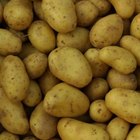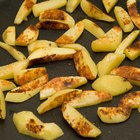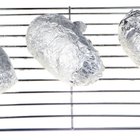
When you peel away the skin, the firm flesh of the potato is revealed. Its color varies depending on the micronutrients that it contains. Although cream, yellow or purple flesh is common, red, pink or blue is not unheard of. Brown flesh, however, has nothing to do with nutrients and everything to do with enzymes. If your potatoes turn brown after they are peeled, blame it on PPO.
Safe to Eat
Although the browning that develops on peeled potatoes may look unappetizing, it does not make the potatoes dangerous to eat. The color change is simply an enzymatic reaction and has nothing to do with rot or disease. The browning occurs in all potatoes across the board, but russet varieties tend to have more of a problem than other types of potatoes because they contain less wax.
Blame It on an Enzyme
The PPO -- or polyphenol oxidase -- enzyme is responsible for browning in vegetables and fruits that are cut or peeled. When you remove the peel of a potato, PPO reacts with oxygen in the surrounding air. This reaction can be slowed or stopped altogether by changing the environment. An environment that contains something else for the PPO to react with instead of oxygen eliminates the browning affects.
Watery Solution
Stop enzymatic browning in its tracks with a big bowl of cold water. Place the peeled potatoes in the bowl and add just enough water to cover. The water places a barrier between the potatoes and the air, immediately halting the reaction. If you do not plan to use the potatoes within a half hour of peeling, place the bowl in the refrigerator or add ice cubes to the water to keep it from reaching room temperature.
Cooking Reaction
Don’t be alarmed if refrigerated potatoes turn brown during the cooking process. This browning is the result of another reaction that also does not render the potatoes unsafe to eat. After a few hours of exposure to cold temperatures, the starch in potatoes starts to turn to sugar. This sugar caramelizes and begins to darken, giving the cooking potatoes a brown appearance. This carmelization may change the taste of the potatoes.
Related Articles
How to Boil Potatoes So They Can Be ...

How Do I Preserve Sliced Potatoes?

How Long Do You Roast Potatoes & at ...

How Long Can Raw Potatoes Be Kept in ...

How to Make Cheesy Potatoes Without ...

How to Eat an Orange Peel
Can You Peel Potatoes the Day Before ...

How to Smoke Potatoes

How to Boil Cubed Potatoes to Pan Fry ...

Can You Store Potatoes in the ...
How to Cook Roast & Potatoes in a Slow ...

What Keeps Shredded Potatoes From ...

Why Do You Need to Pierce Potatoes ...

How to Cook Parisian Potatoes

Do Potatoes Go Bad When They Freeze?

Can You Freeze Sweet Potatoes After ...

How to Sautee Potatoes

How to Make and Keep Mashed Potatoes ...

How to Get Salt to Stick to a Baked ...

How to Cook Petite Red Potatoes
References
Writer Bio
Jonae Fredericks started writing in 2007. She also has a background as a licensed cosmetologist and certified skin-care specialist. Jonae Fredericks is a certified paraeducator, presently working in the public education system.
Photo Credits
Digital Vision./Photodisc/Getty Images